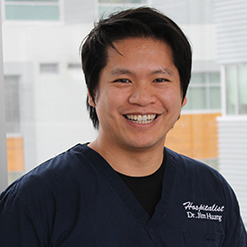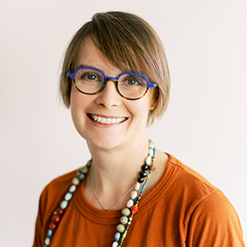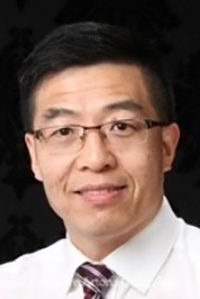Congratulations Dr. Jim Huang, MSc’11, MD’15, a recipient of the 2020-2021 UBC Alumni Builder Award

Knowing that we’re stronger together, a small group of UBC’s first graduates formed alumni UBC on May 4, 1917. The UBC alumni community is now a global network of more than 360,000 UBC alumni in 140 countries.
The Alumni Builder Awards were established as part of alumni UBC 100, the alumni association’s centennial, to recognize alumni who, in their own way, have made important contributions to the success of UBC and its alumni community. The awards are presented by alumni UBC on the recommendation and in partnership with UBC’s faculties, advisory councils, and other leadership groups.
Dr. Jim Huang, MSc’11, MD’15, is awarded an Alumni Builder Award in recognition of his impactful contributions to the UBC Southern Medical Program (SMP) community as a student through co-founding the SMP Student Golf Tournament that continues to support local charities. As an alumnus, Dr. Huang has shown his continued dedication to the SMP and Kelowna community as a Hospitalist and a Clinical Instructor at UBC.
Dr. Huang’s passion for volunteerism started early in his career. While completing his Bachelors of Science in Biochemistry and Molecular Biology at Simon Fraser University and Masters of Science in Medical Genetics at UBC, he volunteered his time for Big Brothers of Greater Vancouver and the Sunnyhill Health Centre for Children as a Recreational Therapist and Aquatic Therapist Assistant, engaging children with disabilities to live their lives to the fullest.
As an MD student of the SMP inaugural graduating class, Dr. Huang helped co-found the first SMP Student Golf Tournament in 2012 with an organizing committee of fellow students. From its inception, the cofounders’ vision was to bring the SMP and Kelowna medical community together for a day of golf and community building, while raising important funds for local charities. Dr. Huang’s contributions to the first two year’s of the Tournament’s beginnings helped lay the groundwork for successive groups of SMP students to grow this annual event into a highly-regarded community event, supported by local medical students, faculty, staff, alumni, and Kelowna-area physicians every year. Since its inception, the Tournament has raised almost a combined $50,000 for local charities, including the Kelowna General Hospital Auxiliary, Kelowna General Hospital Foundation, and Canadian Mental Health Association (CMHA) Kelowna. In 2019, the tournament raised over $20,000 for Hope Air, a charity which provides transportation for patients in financial need to ensure they receive vital medical care away from their hometowns.
During his time as a student, Dr. Huang also served as an ambassador for the SMP and participated in numerous marketing initiatives for prospective medical students. Today, Dr. Huang is a Hospitalist at Kelowna General Hospital (KGH) and a Clinical Instructor with the Department of Family Practice, UBC Faculty of Medicine, assisting with medical education through moderating small group sessions and teaching students in clinical settings at KGH.
While still young in his career, Dr. Huang has set an example for future SMP alumni by promoting collaboration, community building, and philanthropy in the SMP and Kelowna, and inspiring current and future SMP students to do the same. Please join the UBC Southern Medical Program and the UBC Faculty of Medicine in recognizing Dr. Huang for his service, dedication, and contribution to UBC and its alumni community. Tuum Est!
In all, 19 Alumni Builders are being recognized this year. A complete list of recipients can be found at www.alumni.ubc.ca/alumni-builder-awards/ . Recipients will be recognized this winter and spring at a host of alumni programs and special events.
To learn more about alumni UBC, Alumni Builder Awards Program and other initiatives, you are invited to visit the www.alumni.ubc.ca/alumni-builder-awards/
Congratulations Alixandra Bacon, BSc’07, BMw’12, a recipient of the 2020-2021 UBC Alumni Builder Award
 Knowing that we’re stronger together, a small group of UBC’s first graduates formed alumni UBC on May 4, 1917. The UBC alumni community is now a global network of more than 360,000 UBC alumni in 140 countries.
Knowing that we’re stronger together, a small group of UBC’s first graduates formed alumni UBC on May 4, 1917. The UBC alumni community is now a global network of more than 360,000 UBC alumni in 140 countries.
The Alumni Builder Awards were established as part of alumni UBC 100, the alumni association’s centennial, to recognize alumni who, in their own way, have made important contributions to the success of UBC and its alumni community. The awards are presented by alumni UBC on the recommendation and in partnership with UBC’s faculties, advisory councils, and other leadership groups.
Alixandra (Alix) Bacon, BSc’07, BMw’12, is awarded an Alumni Builder Award in recognition of her service to the midwifery profession through strong leadership in Canada and across the world, and her commitment to midwifery education at UBC as Clinical Faculty.
Since graduating from the UBC Midwifery Program in 2012, Alix has been serving families in the Richmond and Delta communities. Prior to midwifery, she worked as a sexual health educator. She is a part of the Clinical Faculty at UBC and has worked in midwifery education and association-strengthening in East Africa through UBC Midwifery’s Students for Global Citizenship and the UNFPA-CAM Strengthening Midwifery Services in South Sudan projects. As an alumna of the UBC Midwifery Program, Alix was awarded the UBC Midwifery Vision and Leadership Award in 2015.
During her tenure as President of the Midwives Association of BC (MABC), Alix led the contract negotiations working group in preparation for agreement re-negotiation and participated in ongoing re-negotiation with the BC Ministry of Health. At the national level, Alix is the current President of the Canadian Association of Midwives (CAM) and her leadership is focused on advocating for essential supports for midwives, disseminating practice supports and inter-professional collaboration to ensure the sexual and reproductive rights of birth people are prioritized during the COVID-19 pandemic. Alix and CAM are also committed to advocating for the growth of Indigenous midwifery, strengthening associations within our confederacy and globally, and promoting excellence in midwifery practice, reproductive justice, and anti-oppressive approaches to health care through knowledge translation.
Alix’s dedication and passion for midwifery and healthcare is evident as she continues to support the midwifery profession through education and advocacy. Please join the UBC midwives and the UBC Faculty of Medicine in recognizing Alix for her service, dedication, and contribution to UBC and its alumni community. Tuum Est!
In all, 19 Alumni Builders are being recognized this year. A complete list of recipients can be found at www.alumni.ubc.ca/alumni-builder-awards/ . Recipients will be recognized this winter and spring at a host of alumni programs and special events.
To learn more about alumni UBC, Alumni Builder Awards Program and other initiatives, you are invited to visit the www.alumni.ubc.ca/alumni-builder-awards/
John (Dezhong) Li, MOT’20

John (Dezhong) Li, MOT’20 has had a busy few years: completing his high school diploma, becoming a rehabilitation assistant, all the while taking care of his family and young children. Learn about how he hopes to improve the physical and psychological health in his future patients as a new Master of Occupational Therapy graduate.
What drew you to pursuing a Master of Occupational Therapy (OT) degree at UBC?
I had been working in developing and implementing mental health promotion programs to individuals, community groups, and organizations for over 5 years before I moved to Canada as a Federal Skilled Worker. I was really eager to help clients work toward maintenance and enhancement of psychological and social functioning. Pursuing a career as an occupational therapist was an important step for me to help individuals live healthier and more fulfilling lives.
The Master of Occupational Therapy (MOT) Program is designed to meet or exceed provincial and national standards of practice; therefore, I believed it would help me understand the Canadian occupational therapy profession and achieve my career goals.
What is one thing that you are taking with you from your experience in the MOT program?
In an introductory workshop at the beginning of the MOT program, Dr. Susan Forwell, professor and head of UBC’s Department of Occupational Science and Occupational Therapy, shared her working experience with a client, who was a parachute jumper and sustained spinal cord injury. The client was so depressed that he declined to participate in almost all occupational therapy treatments. He stated the only thing he wanted to do was parachute jump. Dr. Forwell respected his goals and made an intervention plan to facilitate the realization of his dream. Through the discussion of this case along with the whole learning journey of MOT program, I was deeply impressed by the meaningfulness of occupations in human life and the therapeutic potential of occupations on mental and physical health.
What is one piece of advice you have for students entering the MOT program?
Trust yourself in the vision of possibilities you can create. You are on the journey of learning how to promote change and enable occupations. You are working with a team of OTs who aim to inspire confidence, hope, and belief in the potential for personal and social transformation.
As you look ahead, what (or who) inspires you?
There are so many people and things that inspire me to move forward. If I have to pick only one, it is the book, Enabling Occupation II: Advancing an Occupational Therapy Vision for Health, Well-being, and Justice through Occupation (Townsend & Polatajko, 2013). It helps me understand the core domain of concern, core competency, and the practice process of occupational therapy. It helps me think holistically about person, occupations, and environment; therefore, we, as occupational therapists, not only promote personal health through enabling occupations, but also promote social justice for fair and equitable opportunities in occupations.
What do you hope will change as a result of COVID-19?
COVID-19 has changed many aspects of people’s life. We started working at home, online learning platform, telemedicine, virtual graduation ceremony, window visit for long term care home, increased unemployment benefits and so forth. However, we still need to increase awareness of negative effects of social isolation and provide social and technological changes to mitigate these effects.
Name one thing on your bucket list. Have you completed it?
In the past few years, I completed my high school diploma, finished the rehabilitation assistant (RA) program, worked as an RA while I was taking the MOT program, and looked after my family and young children. I really want to have some time to play tennis again. I am pretty sure I will complete it soon after I start my desired career.